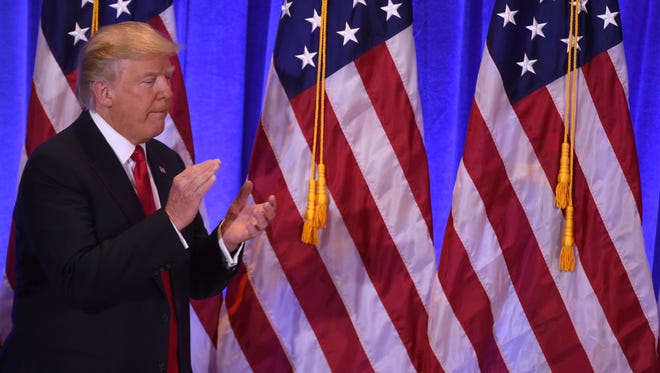Trump won't drop ownership of business

WASHINGTON — President-elect Donald Trump plans to relinquish management of his businesses, but he still intends to retain an ownership stake in his sprawling real-estate and branding empire.
Trump’s adult sons, Donald Trump Jr. and Eric Trump, will run the company, along with a Trump Organization executive. Trump will not make any corporate decisions during his time in the White House, his aides said.
Trump will put his business assets into a trust, and an ethics adviser will join the company’s management team. The adviser, who has not yet been named, will review and sign off on any new business deals that raise potential conflicts of interests, lawyer Sheri Dillon announced Wednesday. The company also will hire a chief compliance counsel to police potential conflicts.
Dillon said the Trump Organization will not complete any new foreign deals but will continue to pursue new domestic business during Trump's presidency. Dillon said Trump's daughter and trusted adviser, Ivanka Trump, will have no role with the company. Her husband, Jared Kushner, will serve as a senior White House adviser to his father-in-law.

Trump and his aides say they are establishing a clear dividing line between his presidency and the business and note that conflicts of interest laws that govern most executive branch employees do not apply to the president or vice president.
"I could actually run my business and run government at the same time," Trump said Wednesday during a news conference, his first since winning the presidency. "I don't like the way that looks, but I would be able to do that if I wanted to."
Trump said he recently rejected $2 billion worth of business deals in Dubai. "I turned it down," he said. "I didn't have to turn it down."
Dillon said the steps announced Wednesday "will completely isolate (Trump) from management of the company."
"President-elect Trump wants the American public to rest assured that all of his efforts are directed to pursuing the people's business and not his own," said Dillon.
Even so, Trump’s action falls well short of recommendations by ethics experts, who have called on him to sell off his assets and put them in a blind trust, not controlled by him or his family members. Most recent presidents have used blind trusts. President Obama’s assets are in mutual funds and Treasury bonds.
His steps also are far less than required of his Cabinet and White House picks, who are subject to conflict of interest rules. For instance, Rex Tillerson, Trump's choice for secretary of State, has reached an agreement with government officials, to sell all his stock and walk away from his former employer, Exxon Mobil.
Several watchdogs, including the federal government's top ethics watchdog, said Trump’s decision failed to address the problems his tangled business interests will pose.
In an unusual move, Walter Shaub, who oversees the Office of Government Ethics, criticized Trump's plan publicly, saying it "doesn't meet the standards that the best of his nominees are meeting and that every president in the past four decades has met."
Norman Eisen and Richard Painter, two former White House ethics lawyers who have been among Trump’s most dogged critics on potential conflicts, also slammed the plan. They called Trump’s move to wall himself off from the Trump Organization “inadequate and scantily detailed.”
Read more:
How Trump is navigating the Emoluments Clause
Wide-ranging news conference finds Trump confident, combative and optimistic
Top government ethics official denounces Trump's business plans
The long-anticipated announcement about Trump's business dealings came nine days before his Jan. 20 swearing-in, and it was clear Wednesday that his aides still were in the process of establishing the terms of the trust they say will be in place before Trump begins his takes office. Officials said they also were still interviewing candidates for the ethics adviser post.
Trump's ownership of the hundreds of companies that make up the Trump Organization has raised the potential for conflicts of interest unprecedented for a U.S. president. Trump has begun to walk away from some of his business interests in recent months, ending projects in countries such as Brazil and Georgia. He also has announced plans to shutter his foundation.
However, Trump’s companies still have global ties. In a series of tweets last year, Trump pledged the Trump Organization would engage in “no new deals” while he’s in office.
On Wednesday, Dillon said that prohibition would apply only to new agreements overseas while Trump is in the White House and said the company will continue to enter into new contracts domestically. Those arrangements, she said, will be reviewed by the ethics adviser and outside experts.
She said it was unrealistic Trump to sell off his assets because it would raise questions about whether the buyer had sweetened the deal to influence the incoming president. Dillon said putting the company — which features Trump's name on everything from hotels to golf courses — into a blind trust also posed problems.
"President Trump can't un-know that he owns Trump Tower," she said of his Manhattan skyscraper.
Ethics watchdogs, however, have warned that Trump could run afoul of the “Emoluments Clause,” an anti-bribery provision of the Constitution that forbids the president from receiving profits or gifts from foreign governments.
Trump aides argue that the clause does not apply to “fair value exchanges,” such as a foreign government paying to stay at the Trump International Hotel in Washington. To avoid the appearance of any conflicts, Trump has decided to donate the profits from foreign payments at his hotels to the U.S. treasury, Dillon said,.
"No one would have thought when the Constitution was written that paying your hotel bill was an emolument," she said.